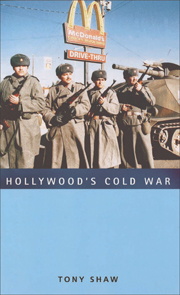Book contents
- Frontmatter
- Contents
- Acknowledgements
- List of Abbreviations
- Introduction
- 1 Love and defection
- 2 The enemy within
- 3 Projecting a prophet for profit
- 4 Of gods and moguls
- 5 Negotiable dissent
- 6 Turning a negative into a positive
- 7 A cowboy in combats
- 8 Secrets and lies
- 9 The empire strikes back
- Conclusion
- Bibliography
- Film Index
- General Index
8 - Secrets and lies
Published online by Cambridge University Press: 05 August 2013
- Frontmatter
- Contents
- Acknowledgements
- List of Abbreviations
- Introduction
- 1 Love and defection
- 2 The enemy within
- 3 Projecting a prophet for profit
- 4 Of gods and moguls
- 5 Negotiable dissent
- 6 Turning a negative into a positive
- 7 A cowboy in combats
- 8 Secrets and lies
- 9 The empire strikes back
- Conclusion
- Bibliography
- Film Index
- General Index
Summary
I will now read a short wire that I have been asked to read by the Vietnamese people from the delegation for the Viet Cong at the Paris peace talks: ‘Please transmit to all our friends in America our recognition of all that they have done on behalf of peace and for the application of the Paris accords in Vietnam. These actions serve the legitimate interests of the American people and the Vietnamese people. Greetings of friendship to all American people.’
Bert Schneider, speech at the 47th Annual Academy of Motion Picture Arts and Sciences Awards, Dorothy Chandler Pavilion, Los Angeles, 8 April 1974Film historians differ fundamentally on Hollywood output of the 1970s. Citing the early sixties-set teen movies American Graffiti (George Lucas, 1973) and Animal House (John Landis, 1978), some see it as essentially nostalgia-driven and backward-looking. Pointing to the right-wing cop/vigilante movies Dirty Harry (Don Siegel, 1971) and Death Wish (Michael Winner, 1974), others pronounce it reactionary, even fascist. Focusing on the phenomenal success of Jaws (Steven Spielberg, 1975) and Star Wars (George Lucas, 1977), other historians see it as a major step on the road towards the present-day dominance of the international film market by ‘high-concept’, special-effects-based blockbusters. Still others regard it as the last golden age of cinema in America, when creative directors held an unprecedented degree of power and were able to produce such risky, character-driven, high-quality work as Mean Streets (Martin Scorsese, 1973) and One Flew over the Cuckoo's Nest (Milos Forman, 1975).
- Type
- Chapter
- Information
- Hollywood's Cold War , pp. 234 - 266Publisher: Edinburgh University PressPrint publication year: 2007



